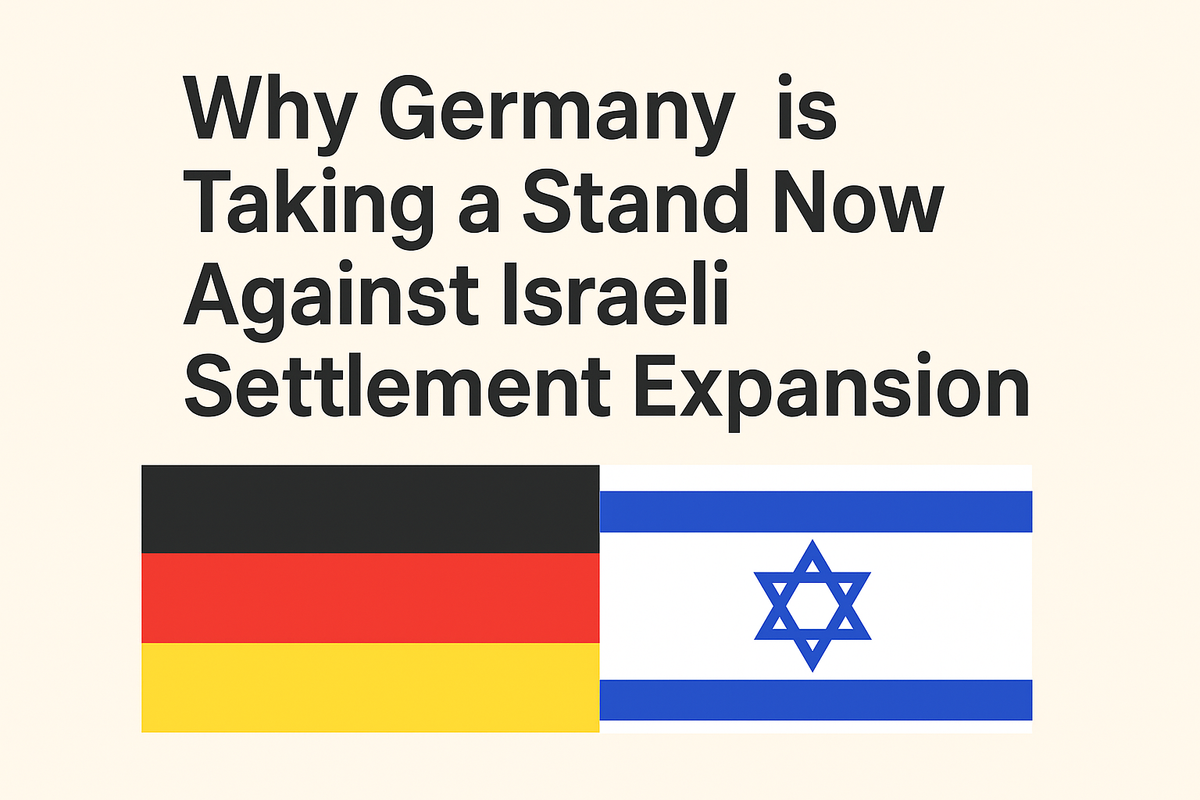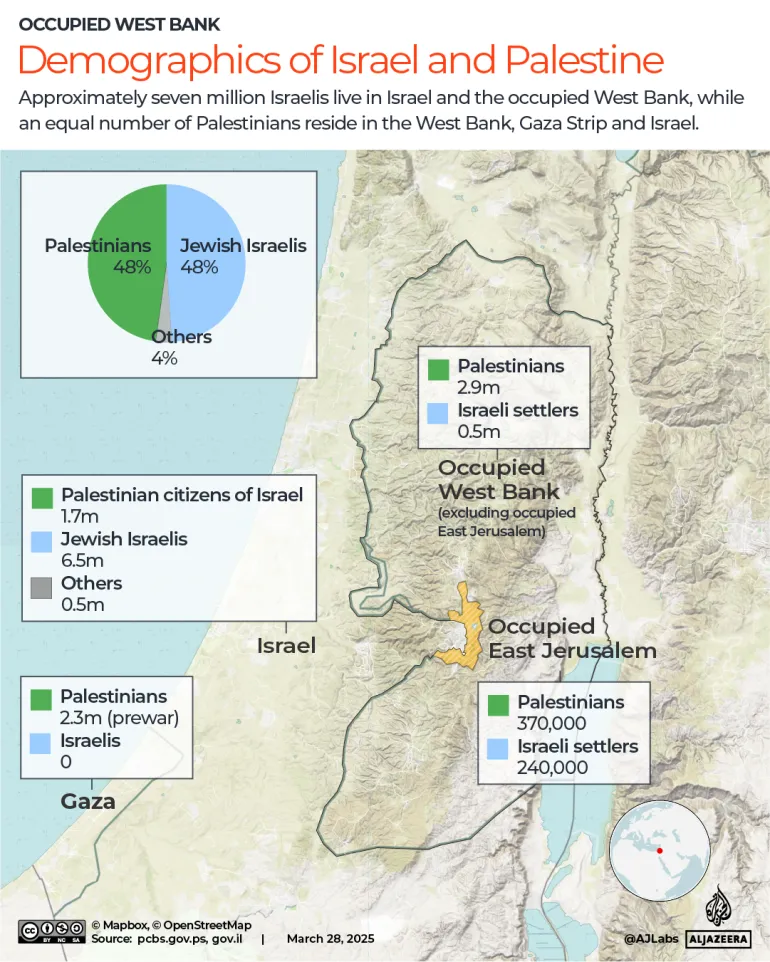Germany’s Unprecedented Stand: Unpacking Berlin’s Shift Against Israeli Settlement Expansion
Germany, long a staunch defender of Israel, has taken a firm stance against new settlement plans in the West Bank.

Written by Lavanya, Intern, Allegedly The News
BERLIN, August 15, 2025
For decades, Germany’s foreign policy toward Israel has been guided by the principle of Staatsräson, a profound moral commitment rooted in the historical responsibility for the Holocaust. This has made Germany one of Israel’s most steadfast allies, often providing a diplomatic shield against international criticism. However, in a move that has sent shockwaves through the diplomatic community, Berlin has recently taken a firm and public stand against Israel’s expansion of settlements in the occupied West Bank. This decisive action is not merely a statement of disapproval; it is a profound re-evaluation of the "special relationship" and a potential turning point in how the international community engages with the Israeli-Palestinian conflict.
The Immediate Catalyst: A Settlement Plan that 'Buries' Peace
The latest controversy was ignited by an announcement from Israel’s far-right Finance Minister, Bezalel Smotrich, to proceed with the controversial E1 settlement project. This specific tract of land, located east of Jerusalem, has been a diplomatic red line for the international community for years. The plan aims to build thousands of new homes, effectively creating a contiguous Israeli urban bloc that would geographically bisect the West Bank, separating the northern and southern halves and cutting off East Jerusalem from the rest of the Palestinian territories. Smotrich himself was quoted as saying this plan would “finally bury the idea of a Palestinian state.” This statement was a direct and undeniable challenge to the international consensus on a two-state solution and the viability of a future Palestinian state, providing the immediate and urgent trigger for Germany’s public rebuke.
The timing of this German statement is critical. Coming just as global attention is focused on the ongoing humanitarian crisis in Gaza and growing international calls for a ceasefire, the settlement announcement was seen by many as a provocative move designed to capitalize on the conflict. For Germany, the move was seen as an unacceptable escalation that threatened to further destabilize the region and undermine any hope of a lasting peace. The German Foreign Ministry's statement was a clear and unambiguous response, firmly rejecting the plan and calling for an immediate halt to all settlement construction, which it described as a violation of international law. This was not a nuanced, behind-the-scenes diplomatic protest but a direct, public, and forceful rejection of a key policy of the Israeli government.
The Erosion of a Viable Palestinian State: The Long Shadow of Settlements
The issue of Israeli settlements in the West Bank is not new, but their relentless expansion has progressively eroded the practical foundation for a two-state solution. Since 1967, Israel has established over 250 settlements and outposts, housing hundreds of thousands of settlers. These settlements consume vast tracts of Palestinian land, fragment communities, and are linked by a network of Israeli-only roads that bypass Palestinian towns. The result is a patchwork of disconnected Palestinian enclaves surrounded by Israeli control, making a contiguous and independent Palestinian state an increasingly distant and theoretical concept.
The E1 project is particularly egregious in this context because it targets one of the few remaining land corridors that could connect the northern and southern parts of the West Bank. Its construction would effectively create a chokehold, making travel, trade, and governance for a future Palestinian state nearly impossible. This reality is not lost on Germany or the wider international community. As the viability of a two-state solution diminishes, so too does the prospect for a peaceful resolution, leaving a vacuum that can only be filled by continued conflict and instability. The German government's position is a recognition that the unchecked expansion of settlements is no longer a peripheral issue but a central obstacle to peace.
The Legal and Ethical Framework: International Law and Global Condemnation
The international community's opposition to Israeli settlements is grounded in a well-established legal framework. The consensus among international lawyers and global bodies is that the settlements are illegal under international law, a position reaffirmed by numerous United Nations resolutions and the International Court of Justice. The most critical legal instrument is Article 49 of the Fourth Geneva Convention, which prohibits an occupying power from transferring its own civilian population into the territory it occupies. The rationale behind this article is to prevent a belligerent state from altering the demographic makeup of occupied territory, thereby securing a long-term strategic advantage.
Israel disputes the applicability of this convention, arguing that the West Bank is not "occupied" but "disputed" territory and that the settlements were not the result of forced transfers. However, this interpretation is widely rejected by virtually all international bodies. The consistent legal opinion is that Israel is the occupying power in the West Bank and East Jerusalem, and the settlements are therefore in violation of international law. This legal position is not merely academic; it forms the moral and ethical bedrock of the international community's opposition. For Germany, a country that places a high value on international law and human rights, continuing to remain silent on this issue would have been a fundamental contradiction of its own foreign policy principles.
Germany’s Shifting Position: From Unconditional Ally to Critical Partner
Germany's relationship with Israel, often referred to as a "special relationship," has always been complex. Shaped by the historical trauma of the Holocaust, Germany’s political and moral imperative has been to ensure Israel's security. This has often meant Germany acting as a protective force for Israel within the European Union, blocking stronger collective action and criticism. However, recent events have revealed the limitations of this unconditional support.
The recent suspension of military exports that could be used in Gaza, announced by Chancellor Friedrich Merz, was a significant departure from this long-standing policy. While the move was framed as a temporary measure, its symbolic weight is immense. It signals that Germany is no longer willing to provide blanket support for all of Israel's policies, particularly those that undermine the prospects for peace and are widely seen as violations of international law. This is a profound moment in the bilateral relationship, demonstrating that Germany's commitment to Israel's security is now being balanced against its commitment to international law, human rights, and the prospects for a peaceful resolution to the conflict. This is not a rejection of Israel but a redefinition of the relationship, moving from an unquestioning alliance to a more critical and demanding partnership.

The Broader International Context: A Growing Chorus for Restraint
Germany's diplomatic move is part of a growing chorus of international calls for restraint. The United Nations, the European Union, and individual countries such as the UK and Norway have all condemned the recent settlement plans. The UN Security Council and General Assembly have repeatedly passed resolutions against the settlements, and the International Court of Justice has weighed in on their legal status. This global consensus creates a powerful diplomatic pressure that no country, not even one as militarily powerful as Israel, can fully ignore.
The actions of individual nations like Germany, while perhaps not immediately decisive, contribute to a broader international effort that could ultimately influence Israeli policy. The fear of international isolation, economic sanctions, and the erosion of diplomatic support from key allies are all factors that the Israeli government must consider. The shift in Germany's position, as a crucial partner in the EU and a historically significant supporter, adds considerable weight to these international warnings. It may signal to other nations that it is now politically acceptable to take a firmer line on Israeli policies, potentially leading to a more unified and forceful international response in the future.
Uncharted Territory: What Does the Future Hold for Peace?
The peace negotiations between Israelis and Palestinians have been stalled for years, with the settlement issue being one of the primary obstacles. Germany’s latest diplomatic move, while not a direct intervention in the negotiations, could create new dynamics. By publicly challenging a core policy of the current Israeli government, Germany has made it clear that the status quo is unsustainable. This could force both sides to re-evaluate their positions and may, in the long run, create an opening for a return to meaningful dialogue.
The pressure from Germany and its international partners may not lead to an immediate policy reversal from the current Israeli government. However, it could influence future political calculations within Israel and its allies. It sends a message that a policy of unchecked settlement expansion comes with significant diplomatic and political costs. This could empower moderate voices within Israel and signal to the international community that a more assertive approach may be necessary to preserve the possibility of a two-state solution.
The Limits of Staatsräson
Germany’s decision to take a firm stand against Israeli settlement expansion is a significant moment in modern international relations. It demonstrates that the moral and historical commitments that have long defined Germany's foreign policy towards Israel are not limitless. The principle of Staatsräson is being reinterpreted in light of a changing geopolitical landscape and a growing concern for international law and human rights. This is not a rejection of Israel but a demand for it to act within the bounds of international law and to preserve the prospects for a peaceful resolution. As Germany redefines its role, it may be paving the way for a more unified and effective international approach to the Israeli-Palestinian conflict.
A Look Ahead
Will this be a permanent shift? Germany has suspended military exports and issued a strong statement, but will this diplomatic move be a one-time event, or does it signal a long-term, fundamental shift in Germany's foreign policy toward Israel?
Sources
Reuters, Al Jazeera, The Times of Israel, Amnesty International, and various official statements from the German Foreign Ministry and the UN.




